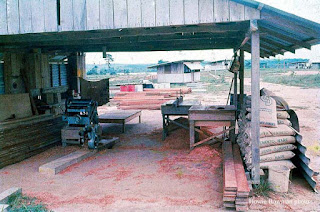Lomalinda’s first settlers must have possessed a strong dose of genetic material passed down from their home countries’ hardiest explorers and homesteaders. Something—faith, courage, DNA—propelled them into the unknown to take on the challenge of it all.
“Do not go where the path may
lead,” wrote Ralph Waldo Emerson, “go instead where there is no path and leave
a trail.” That’s what Lomalinda’s people had done, beginning with her first
pioneers.
In Bogotá on May 25, 1964, six
adults and one baby climbed into a couple of tottering old trucks loaded with
supplies and building materials and set out for what would become their center
of operations.
The journey, a hundred and fifty miles,
took two days.
Full of energy and enthusiasm, they
embarked on making their dreams come true—creating Lomalinda—while living in
tents and cooking over a gas stove on the ground.
For bathing, laundry, and drinking
water, they used lake water, warm and loamy.
They had dreams of building a
school for the many children they planned to have and, since those doing
translation work would also live in even more remote settings several months a
year, they’d build a Children’s Home in Lomalinda to house school-age kids
while their parents were away.
The new center of operations would
be a place to base airplanes and pilots who’d fly those linguists to and from
their work in isolated villages, and a place for radio operators who would keep
in touch with them.
Translation personnel, working in
those primitive (in some cases Stone Age) villages, would learn the indigenous
languages and gather linguistic data.
After a few weeks or months of
intense work, they would return to Lomalinda, reunite with their kids, catch
their breath, and tend to medical and physical needs.
And while in Lomalinda, they’d analyze
the data they’d gathered, meet with language consultants, work on their
translation and literacy projects, and prepare for their next trip to those distant,
primitive village locales.
Yes, Lomalinda was going to be
quite a place.
And so, with those mighty dreams ever before them, and with more families joining them, they built six cabins, twelve feet by twenty feet each, with waist-high outer walls topped by screening.
With
two families sharing each cabin, they put up inside walls to offer privacy, of
sorts—they had a gap at the top that tall people could see over (but that
didn’t seem to hinder anyone from making babies).
Sawmill used by Lomalinda pioneers
They fed their families by growing vegetables and hunting and fishing—even parrot showed up on dinner tables—though occasionally someone pedaled a bike several miles down the road to a small town to buy meat. Local farmers also sold sugarcane, bananas, and eggs.
By Thanksgiving, six months later,
settlers had made progress on an office building, duplexes, and quadruplexes,
as well as facilities they shared—a kitchen, dining room, and a bath/laundry house.
Twelve years later
when our family arrived in Lomalinda,
everyone lived in comfortable houses
with running water, plumbing, and electricity,
but her residents still possessed
that can-do spirit—
self-reliant, steadfast, single-minded.
Stubborn when they had to be.
They were just ordinary folks
slogging along because of God’s grace,
hearts on fire for what He called them to do.
(From Chapter 15, Please, God, Don’t Make MeGo: A Foot-Dragger’s Memoir)


















